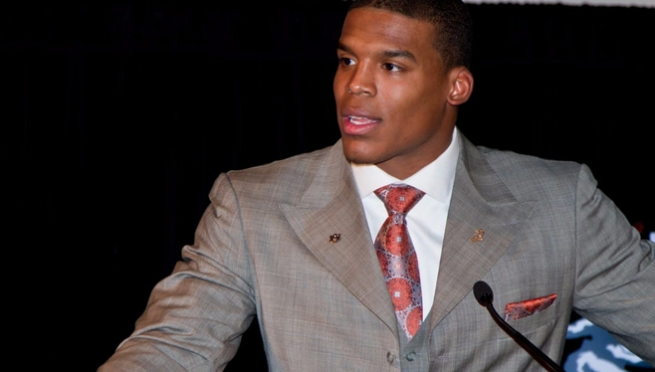Leadership Requires Being Gracious in Defeat
Losing sucks. There's really no other way around it. We can talk 'til we're hoarse about how important failure is, how missteps are vital in teaching us ways to do better, but if we're honest with ourselves, a life full of interrupted successes pretty much trumps a world with consistent failure and the occassional win.
Black Russian Studio | Shutterstock.com
Cam Newton
The pain of losing rises with the stakes, which is why it must have been like dipping a paper cut in gin for Cam Newton to lead a near-flawless team like the Carolina Panthers to a brutal defeat in the Super Bowl Sunday at the hands of the Denver Broncos. There are few stages bigger than the Super Bowl, and sports truly is the ultimate meritocracy. You train hard, you work hard, you play hard and -- if you do all those things better than 19 other teams, you are on top of the football world.
Cam Newton lost. Badly. He was man-handled, watching many of his plays from the ground after getting knocked down repeatedly by Denver's top-ranked defense. Losing hurt him -- physically, emotionally, psychologically, spiritually. A man known more for his iconic celebratory dab had no reason to cheer. Or even to smile.
But Cam Newton made his loss worse by losing even more after the game. In a cringe-worthy postgame press conference, Newton, normally so engaging, to the point of being garrulous, turned monosyllabic when the media began asking about the game. He was disconsolate at the loss, but he morphed into rudeness, a dismissiveness that's unbecoming for someone who has become such a role model to fans. It was short, discourteous and ungracious.
Sadly, it also seems to be part of who Cam Newton is. The Panthers lost one game in the regular season, to the Atlanta Falcons, and here he showed another sign of bad sportsmanship and sore losing, reportedly not shaking hands with opposing team members after the game.
That's antithetical to good leadership. It's just not cool. We should shine during our wins, even celebrate when things go our way, but leadership demands that we also be gracious in our defeats. Whether we lose on the gridiron or in the boardroom, our defeats are usually a healthy combination of our own personal and professional shortcomings and better play by our opponents. That's reason to be introspective and mad as hell at yourself, but that can never turn to anger at the people around us -- our teammates, our customers, our fans, our partners. It goes beyond simple stoicism to actual grace, to appreciating the success of others to the point that we marvel at it, envy it even, so that we can ultimately learn what's necessary to make that achievement our own.
Interesting, Cam Newton had a lot of potential role models in that regard, particularly across the field on the Broncos' sideline. Many are contrasting him with Peyton Manning, who may have thrown in last pass in a sure-to-be Hall of Fame career. But a better example is Wade Phillips, who wasn't even coaching last year and has had a string of big-time defeats, including a disappointing run as head coach of the Dallas Cowboys. Like all coaches, his firings have been very much public. Yet, Phillips has never thrown a tantrum, to the press or to anyone, knowing that each defeat is an opportunity to do a better job the next time. Now, Phillips can be rightly counted as leading one of the top defenses in NFL history. He outclassed Cam Newton, on and off the field.
There is hope for Cam Newton. For all the focus on his ability, which rightfully earned him the MVP for the NFL this season, we often forget that he's still young. We can criticize him for a lack of maturity, but we also have to recognize that the wisdom needed to appreciate maturity comes slowly. There is time yet for this young man, and reasons to be optimistic. After all, most of us look back on our lives in our 20s with a knowing smirk and a subtle shake of our head, wondering what we were thinking.
Until that maturity comes, until he shows a grace that rivals the power of his talents, he can never be counted as a true leader.
Nor can any of us.


